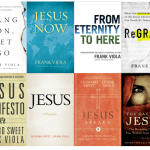After nearly six years at Midwestern Baptist Theological Seminary, I am taking a position at Grace Bible Theological Seminary in Conway, Arkansas. I will be the Provost and Research Professor of Theology at GBTS, serving this seminary led by President Jeff Johnson. Jeff’s robust theological ministry, personal humility and godly character, and love for Christ’s church is what initially drew me to the school. I am overjoyed about working with him and several brothers to build a sound seminary in the Reformed tradition. The school is young, but has already brought lecturers like Voddie Baucham, Jr., Joel Beeke, and Tom Nettles to campus.
Here is the official announcement from Jeff Johnson, President of Grace Seminary. It includes a brief video of Jeff and me discussing my appointment (watch it here as well).
This is a day of many emotions. After all, the Lord has been richly kind to my family and me during our time in Kansas City. President Jason Allen recruited me to MBTS some six years ago, and gave me numerous opportunities to develop as a theologian at this seminary. I found real pleasure in writing books and articles, leading the Center for Public Theology, establishing the City of God podcast, editing Permanent Things, serving for three years as Director of the Residency PhD program, being first reader (and second) on numerous dissertations, and more. Simply put, in more ways than I can enumerate here, Dr. Allen made it a joy to labor at Midwestern. Dr. Jason Duesing has established an excellent academic culture at MBTS, helped me in many respects, and shepherded faculty well. These men and numerous other colleagues have blessed me and my family. Perhaps most of all, I have relished teaching our students. I’ve gone to my native New England with them, played basketball with them, taught them for hours in the classroom, laughed with them, eaten delicious Joe’s and Q39 barbecue with them, debated a few of them, spent many hours on their papers, discussed PhD matters with them, and generally been blessed to know them. I give thanks to God for them, and I can only say with deep feeling that I will miss them.
Though I am leaving the SBC at this time–joining a non-SBC church and teaching at a non-SBC seminary–I want to state up front my respect and thankfulness for so many SBC friends, colaborers, and churches. My move to Conway should not be interpreted as a martial move against my SBC brothers and sisters; to this day, a sizeable portion of the closest friends I have, and the pastors and congregations I most respect, are in the SBC. I want those bonds to hold. There are indeed fault lines emerging in our time, fault lines occurring because of serious issues that need attention and theological handling. I wish to be clear, however, that I give thanks to God for many good years in the SBC (nearly two decades), I see many who love and minister God’s truth in the SBC, and I praise God for many cherished friendships that have developed in the SBC.
We have also had four terrific years at Mission Road Bible Church. Alongside a body of faithful elders, Rick Holland’s excellent ministry has strengthened my family and me in Christ. This church is filled with men and women who love the Lord. We treasure the saints at Mission Road, and it will be painful to leave this congregation. But now we do what followers of God have been called to do since ancient days: we go to a new seminary, Grace, and we will soon join a rapidly-growing Reformed church, Grace Bible Church. The two are closely connected. The school has a laser-focus on forming pastors, and doing so in the context of the local church. Many, though not all, of our students will be members of Grace Bible Church; in a discipleship-starved age, they will not be left to themselves to figure things out, but will be fully integrated into the life of the body, and trained in strong biblical manhood. (We will also gladly enable regional students to attend classes even as they live and minister elsewhere.)
Hugely valuable as the local church is, there is also a great deal to learn in a classroom setting. (Grace Seminary has a beautiful building featuring an elegant reading room, and is also equipped for a small coffee shop; contextual ministry, ladies and gentlemen.) The school offers a rigorous MDiv that is currently 100 hours in length. It includes four classes each in Greek and Hebrew, and eight different theology units. As is clear, the school asks that students go deep in their education, as med-school students or business-school students do in getting a MD or MBA, for example. Recall on this count that in our online age, generally dismissive of in-person training and lecturing, the Ivy League and Oxbridge institutions have not moved an inch from traditional residential education. Nor, in the military realm, are Navy SEALs trained through YouTube. Neither do we who train students to ready souls to meet the living God plan to do so.
At Grace Seminary, the entire school will have a pastoral edge, an edge smacking of Calvin training the first generation of Swiss Reformed pastors in the Genevan academy, Edwards mentoring young candidates on walks in the Massachusetts forest, Spurgeon gathering his students for lectures in wood-paneled London rooms. We want less “the pastor as the felt-needs-meeter who is so nice he never makes a wave,” and more John Knox defying evil magistrates in order to preach the unadulterated gospel. In terms of academic standards, GBTS is well into the process of securing accreditation. It intentionally will not come through secular accreditors, but through the Association of Reformed Theological Schools. In our academic program, we want the MDiv to be the standard. While we believe a select few should get a PhD and that the PhD offers real value, we in no way envision the PhD as a necessary qualifier of the pastor-theologian. (We do not offer the PhD, DMin, or ThM at GBTS, though I may supervise PhD students through another school.) Our aim is to produce men who do the MDiv and then launch.
At Grace, we seek a learned ministry without apology. Yet we will be steering clear of an academicized vision of training, one that has claimed so many schools in previous generations, that pulls students more toward philosophical speculation, human tradition, unregenerate reason, secular credentialism, and effete refinement than exegetical theology. We want our students to love the Bible, know the Bible, minister the Bible, and bleed the Bible. Recognizing Scripture alone as the Word of God, and teaching without hesitation that no extrabiblical source norms or plays watchdog over the Scripture, we gladly locate ourselves in the stream of confessional Baptist theology. Grounded in Second London, we look for inspiration to the Reformed Baptist tradition more broadly, Old Princeton, Spurgeon, Machen’s Westminster (where Van Til and John Murray charted a helpful course apologetically and doctrinally), and many more besides.
This stream matters much to us. In our day, it is common today to talk a lot about the gospel. That is good in many senses, but we seek to locate the gospel squarely in the biblical system of doctrine. The Reformed movement seems in some places to have morphed and weakened in our time, to have lost its boldly counter-cultural orientation, but we wish to pass on to students a thoroughly Reformed theology, worldview, and ministry vision. All this learning has a pastoral edge, though; as time goes on, we will seek to form connections with sound ministries that will enable our students to plant churches, revitalize churches, and land on far frontiers for pioneering missions work. We want less mainstream pastel-colored Christianity, and more of the world-defying, safety-eschewing, comfort-relinquishing spirit of David Brainerd, George Liele, Jim Eliot, and the recently-deceased Joel Tiegreen.
Our boldness is both ecclesial and theological. GBTS is not going to play the middle on tough issues. The school will train its students to do what Paul called Timothy to do: to guard the good deposit, to give instruction in sound doctrine, and to refute those who contradict it (2 Timothy 1-2; Titus 1:9). This work is for pastors, firstly, much as such a focus has been diminished in our time. As Paul saw it, ministry is founded in “open statement of the truth,” and in clear and loving refutation of those who go against it (2 Corinthians 4:2; Ephesians 4:15). Toward that end, as one example, the school will celebrate the cross of Christ as the unifying force of people of every background, people group, and shade of skin. God is forming a people for himself from every tribe, tongue, and nation; he is creating the “new humanity” in his Son (1 Corinthians 15). However, while decrying racism and rejoicing in the genuine diversity of Christ’s church, GBTS will not have a single molecule of the ideologies of “wokeness” and “social justice.” In fact, both the President and the Provost of the school will have published against such Marxist divisiveness as of this summer. Jeff’s helpful Free Grace Press book is found here, and mine is found here. Jeff’s sold out its initial print-run in less than three weeks, a remarkable providence. (To get familiar with this excellent press, you should check out the entire FGP catalogue, and you should surely buy Jeff’s DVD and book on the church.)
All this is a precis of the vision Jeff Johnson and I share. (In addition to our shared work at the school, Jeff and I have ambitions for expanded Reformed media and online content.) What a privilege it will be to work with him, Preston Kelso (Academic Dean), Daniel Thursby (Director of Administration), the elders of GBC, and many regional pastors and churches. Over the last six years, I’ve made numerous trips to Arkansas and witnessed the strong biblical culture in the state. I’ve had many godly, sharp students from Arkansas and surrounding states (including Texas) at both MBTS and SBTS before that. I am eager to experience this vitality firsthand not merely in a ministry trip, but as a resident of Arkansas, and to integrate with my family in a part of America that is naturally beautiful, communally vibrant, and has some great coffee to spare. (The basketball culture in the state is no bad thing, either!) I’m also eager to bring students to my beloved New England and other possible ministry locations across America and the world; it’s my hope that our graduates will go to all corners of God’s earth with the good news of the gospel.
In conclusion, I am thankful to the Lord for eleven years of service to SBC institutions in the seminary realm. My family and I have been in SBC churches for almost twenty years, and God has been so gracious to us to give us this last decade under gifted leadership–first Al Mohler, then Jason Allen–and to watch two schools grow as they built off of the foundation of the Word. Now, we enter a new season. As we go to Conway, we know that Christ goes before us. This is what he said to the disciples in the last part of the Great Commission: “I will be with you always” (Matthew 28:20). As believers, we cling to this promise in all seasons, including this one. The days are indeed evil just as they were in Christ’s era, but like that moment in history, this is a marvelous time in which to dream great things for Christ’s glory, and to attempt great things in his matchless name.














